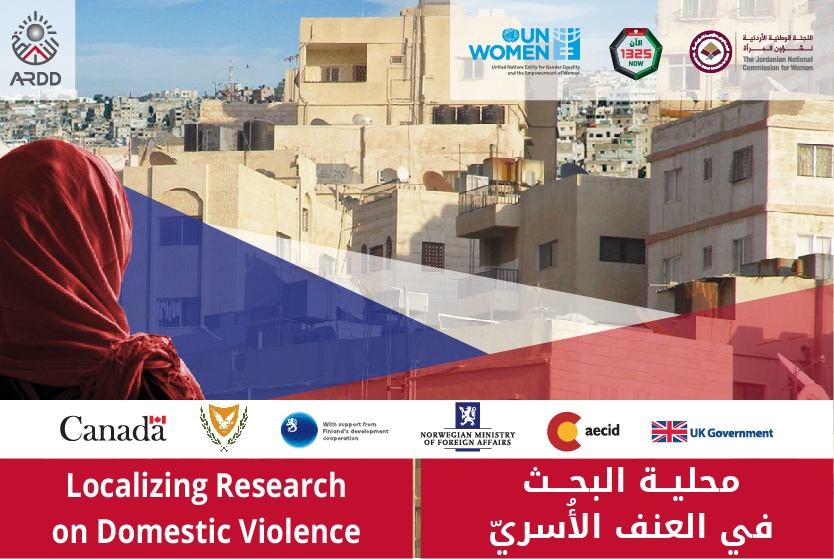Given the importance of nurturing the role and capabilities of local civil society institutions, especially those run by women leaders, in monitoring and analyzing the reality of their communities and the environment regulating their work, all of which qualify them to engage in sensitive issues such as social and domestic violence, this report, in which 11 organizations participated, seeks Civil society members of the Jordan National NGOs Forum (JONAF) to research domestic violence from a societal perspective.
This report explores the local community’s perceptions and attitudes towards violence against women and girls, focusing on the levels of awareness, attitudes, and societal responses to these cases through the work of ARDD with local organizations to enhance their capabilities to enable them to conduct their own research; Including identifying the different types of domestic violence, and raising awareness of the signs and effects of domestic violence against women and girls, in addition to providing an opportunity for organizations to develop community-based prevention and response mechanisms in order to improve the support provided to survivors of violence.
The report, which comes as part of the action research conducted by ARDD’s Al Nahda Center within the framework of the project “Strengthening the Capacities of Women-led CSOs in Evidence-Based Advocacy and Women, Peace, and Security (WPS) Agenda” supported by UN Women with the generous funding of the governments of Canada, Finland, Norway, Spain, the United Kingdom, and Cyprus, presented several specific recommendations that are incorporated through three policy briefs to mitigate these cases.
Enhancing access to Services for Survivors of Domestic Violence: Building Trust in National and Local Service Providers
Inadequate knowledge of service providers’ policies and procedures discourages victims from filing complaints. Families may know about the Family Protection Department but are often unaware of the services the department and local civil society organizations provide, or of their role in protecting victims of domestic violence. By collaborating with CSOs, the FPD will be able to expand awareness about its work and enable access to its services to a broader region, so CSOs can refer cases to the FPD, as well as equip FPD with communication material that helps it reach local communities as such when awareness is raised about these services and procedures, trust in services providers will be enhanced
Economic empowerment and mitigating domestic violence risks
A participatory approach needs to be ensured to better identify the needs of the survivors and the services offered to them should be reviewed regularly, in addition to building economic empowerment in a vision of mitigating domestic violence, taking into account the local perspective.
Building a Women´s Network for Empowerment and Solidarity
The topic of domestic violence continues to be perceived as too sensitive in Jordanian society, and women refrain from reporting it due to factors such as societal norms, fear of retaliation, maintaining family cohesion, and economic challenges. To maintain confidentiality and not endanger the cohesion of their families, respondents highlighted that survivors turn to their family members for assistance and support.
Establishing a network that empowers women to fight against GBV would create a safe and comfortable environment in which women can discuss GBV and support each other.
Enacting legislative reforms
Like other countries in the region, various reforms must be made by Jordan to assist and protect women who are at risk of violence and harassment. It is imperative that the Jordanian parliament enact laws and legislation that will guarantee the safety, dignity, and respect of all women, as well as laws that mete out strict penalties for abusers. Furthermore, the role of the judiciary in resolving conflicts arising from domestic violence by following up on settlements, must be enhanced, rather than following administrative procedures, and strengthening protection orders.
In addition to the governmental and legislative roles, there is an integrative role that falls on the shoulders of all concerned parties: Human rights organizations must be trained to deal with cases of violence and provide adequate protection for the survivors. Media institutions must implement training programs to educate society, as well as revise the media discourse on violence against women.
Given the importance elicit local knowledge and support locally in response to the reality of society, its challenges and needs according to its priorities and perceptions of solutions, to strengthen research on issues of community and domestic violence to address indicators of emergency needs, find evidence of progress made to build on it, ARDD continues to work with its partners to support the research agenda and communication with all concerned parties to advocate for these recommendations and work on them together and ensure that resources are found to achieve them


